Home » Posts tagged 'higher education'
Tag Archives: higher education
Maria J. D’Agostino — Negotiating Bias in the Workplace
If gender inequity is baked into today’s workplace, what can John Jay students and other Master in Public Administration (MPA) candidates do to fix the problem? Dr. Maria D’Agostino, with co-authors Helisse Levine (LIU-Brooklyn) and Meghna Sabharwal (UT-Dallas), published an article in the Journal of Public Affairs Education in March that represents the first step toward answering that question.
Dr. D’Agostino, an Associate Professor in the Department of Public Management, has focused her recent research on women in public administration. Not only are women — along with other persons whose gender presentation isn’t traditionally male — underrepresented in leadership and management roles but, according to the theory of Second Generation Gender Bias, the workplace isn’t even built to accommodate the needs of anyone but men.
Longstanding cultural beliefs and biases, formed over many decades, put up invisible barriers to women’s advancement, and workplace structures and practices can inadvertently favor men. One such practice is negotiation, which figures prominently in 21st century workplaces. When negotiating for starting salaries and other benefits, studies show that men see better negotiation outcomes than women, and that these differences are more due to stereotyping and structural bias than to behavioral differences. Negotiated Order theory, which has also heavily influenced D’Agostino’s work, suggests that the results of biased negotiations build up over time, meaning that when women or people of marginalized genders start out behind, they usually stay behind.D’Agostino believes that MPA programs are a great place to take on these challenges. “A lot of experimentation goes on in the public sector,” she said, giving examples of vital pieces of legislation that have trickled down from government policy to private sector workplaces, including Title IX, Paid Family Leave, and New York City’s 2017 law barring employers from asking about applicants’ salary history.
According to D’Agostino, MPA graduates are often perfectly placed to address inequality. “[Graduates] work in city, state, and federal government, they work in nonprofits, and in the private sector. The essence of public administration is serving the public and the common good, and they are the face of that; they are the decision-makers in terms of creating policy that becomes city, state, and federal law, which can even spread to the private sector. They are both creating and implementing policy, so they have a big impact on the future.”
It is therefore a concern for D’Agostino and her colleagues that more MPA programs aren’t tackling issues of workplace inequality head on. In her study, researchers surveyed MPA administrators to find out how many programs around the country offer courses in negotiation, let alone courses that incorporate elements of gender bias into coursework. They found that “none of the programs offered a standalone course on gendered negotiation, and those that offered courses on negotiation generally only focused on transactional portions,” said D’Agostino.
Her suggestion? Incorporate second generation gender bias into curricula as a core competency for all MPA programs. Raising awareness among students in the field could lead to big changes inside workplaces, but also in the ivory tower. “Academics could do more research, which could inform practice, which would affect training, which would impact the field in terms of gender equity.”
These are big dreams for sweeping change in MPA programs and in offices across the U.S. For now, D’Agostino and her colleagues are developing a conceptual framework for talking about the issue. Her next step is to interview both men and women in various positions in seven states, to try to understand the implications of second generation gender bias as they play out in real workplaces and to hear about real workers’ experience with bias.
You can find the full article, “Gender in negotiation: Preparing public administrators for the 21st century workplace,” online at the Journal for Public Affairs Education’s website.
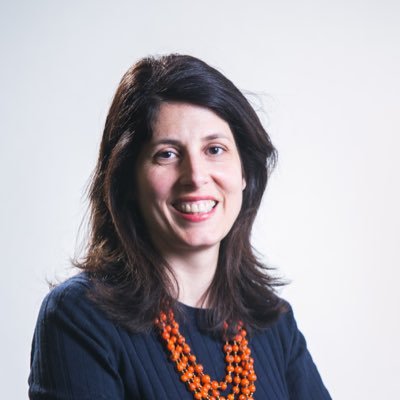 Maria D’Agostino is an Associate Professor in John Jay College’s Department of Public Management. She is also the co-founder of Women in the Public Sector at John Jay, a program which educates, engages, and fosters a consortium of students, faculty, public service practitioners, and community members interested in women in public service. It promotes gender equality and provides opportunities to address gender issues in public service.
Maria D’Agostino is an Associate Professor in John Jay College’s Department of Public Management. She is also the co-founder of Women in the Public Sector at John Jay, a program which educates, engages, and fosters a consortium of students, faculty, public service practitioners, and community members interested in women in public service. It promotes gender equality and provides opportunities to address gender issues in public service.
Dr. D’Agostino is the co-recipient, with WPS co-founder Dr. Nicole Elias, of the 2018-19 Inaugural Presidential Student-Faculty Research Collaboration Award from John Jay’s Office of Student Research and Creativity, for the examination of gender equity in municipalities. Her recent research has focused on women in public administration, including a 2018 co-edited book, Governing in a Global World: Women in Public Service.
Fostering Success in STEM – Dr. Edgardo Sanabria-Valentín
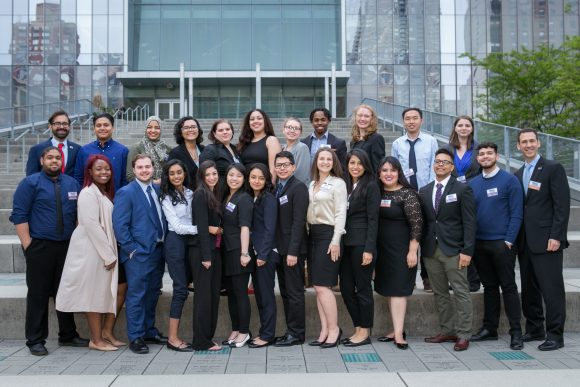 Dr. Edgardo Sanabria-Valentín sees himself in the PRISM students he works with. He credits his alma mater, the University of Puerto Rico, with instilling in him the spirit of preparedness that he brings to student researchers and presenters at John Jay — being ready not only with the technical facts but with the message about why your research is important, and how you are changing the world.
Dr. Edgardo Sanabria-Valentín sees himself in the PRISM students he works with. He credits his alma mater, the University of Puerto Rico, with instilling in him the spirit of preparedness that he brings to student researchers and presenters at John Jay — being ready not only with the technical facts but with the message about why your research is important, and how you are changing the world.
“Because of that, every time we go to a conference, we get minimum one award — my top is three!” he says. “Every time we go to an undergraduate research conference, John Jay’s name always comes up.” It is this tangible commitment to bringing out the best in John Jay’s science students that earned Dr. Sanabria-Valentín, who is the Associate Director of the John Jay Program for Research Initiatives in Science and Math (PRISM), a 2018 APACS President’s Award.
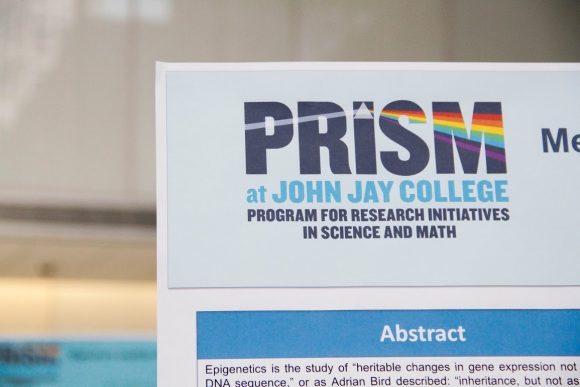
At its heart, PRISM is about teaching students skills, not only in the sciences but also to prepare them to succeed in and after college. “The bread and butter upon which PRISM was founded” is the Undergraduate Research Program. The program provides students with opportunities to be exposed to the process of science beyond their normal classroom studies by working directly with a faculty mentor on an original STEM research project.
And PRISM has grown. A second component is the Junior Scholars program, giving academic support to eligible students that can include stipends, professional development events and supplementary advisement, as well as financial support in applying to post-graduate programs in New York State-licensed professions. Just as important for an institution that counts many first-generation college students among its student body, Junior Scholars collaborates with student support services across the college, like the Math and Sciences Research Center, Center for Career and Professional Development, Wellness Center, Center for Postgraduate Opportunities, and even more. The program is designed to make sure that students have all the tools to get to know their college and excel.
External funding is part of what drives PRISM’s growth. The New York State Collegiate Science and Technology Entry Program, or CSTEP, awards grants to postsecondary and professional schools to start academic support programs — like PRISM — for students from underrepresented minority groups, or who are economically disadvantaged, to help them get into STEM fields. John Jay was among the first class of schools to receive CSTEP funding, thirty years ago and out of roughly 200 PRISM students, the CSTEP grant supports 140. Edgardo’s goal is to double that number over the next five years.
His hard work is a large part of why the CSTEP program is at John Jay — after a short hiatus, Edgardo’s application brought the program back in 2015 — and of John Jay’s unique status as the only school to have institutionalized this type of academic STEM-focused support initiative. He is also responsible for collaborating with other CSTEP schools in the region: NYU, Hostos Community College, Fordham, City College and Mt. Sinai are among the Manhattan and Bronx institutions that participate with John Jay in our CSTEP Regional Research Expos. Participating students are invited to present their own research in poster sessions and attend professional development activities.
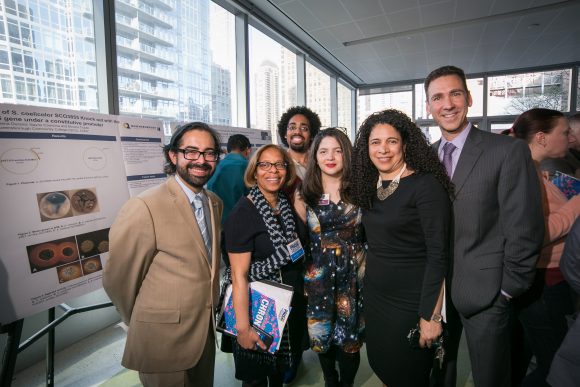
His work on and logistical support for the expos has earned Edgardo an award from the President of the Association of Program Administrators for CSTEP and STEP (APACS). The honor also recognizes his success in running a program that benefits students in the sciences. The advisement services offered by PRISM have created the conditions for increased student success at John Jay and degree completion, and the program puts students on a path toward the pursuit of higher degrees, or toward a place in the workforce in a variety of science, technology and computer science fields. The Undergraduate Research Program has measurably helped students to pursue post-graduate degrees in science, medicine and more.
The bottom line for Edgardo, though, is his students. “My kids blow me away every time,” he gushes. “I have complete pride in showing them off at every conference I go to. I have learned so much by helping them with posters and advising on their projects; it’s encouraging that I sometimes find my students to be smarter than me.”
Learn more about:
PRISM: http://prismatjjay.org/
APACS: http://www.apacs.org/
CSTEP in New York State: http://www.highered.nysed.gov/kiap/colldev/CollegiateScienceandTechnologyEntryProgram.htm
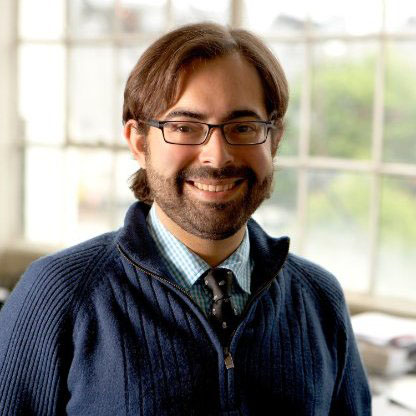 Edgardo Sanabria-Valentín, Ph.D. is the Associate Program Director for PRISM and also the Pre-Health Careers Advisor at John Jay. He holds a Ph.D. from NYU-School of Medicine, where his dissertation work involved studying the mechanisms Helicobacter pylori employs to persist in the human stomach for the life span of each host. He came to John Jay after a Post-Doctoral Fellowship at Harvard Medical School followed by 3 years working in the Biotechnology Industry in Boston. Dr. Sanabria-Valentín is the recipient of the ESCMID Young Scientist Award (2007), a Leadership Alliance-Schering Plough Graduate Fellowship (2006), and the NBHS-Frank G. Brooks Award for Excellence in Student Research (2001). He is also a founding member of the NYC-Minority Graduate Student Network and The Leadership Alliance Alumni Association.
Edgardo Sanabria-Valentín, Ph.D. is the Associate Program Director for PRISM and also the Pre-Health Careers Advisor at John Jay. He holds a Ph.D. from NYU-School of Medicine, where his dissertation work involved studying the mechanisms Helicobacter pylori employs to persist in the human stomach for the life span of each host. He came to John Jay after a Post-Doctoral Fellowship at Harvard Medical School followed by 3 years working in the Biotechnology Industry in Boston. Dr. Sanabria-Valentín is the recipient of the ESCMID Young Scientist Award (2007), a Leadership Alliance-Schering Plough Graduate Fellowship (2006), and the NBHS-Frank G. Brooks Award for Excellence in Student Research (2001). He is also a founding member of the NYC-Minority Graduate Student Network and The Leadership Alliance Alumni Association.



Recent Comments